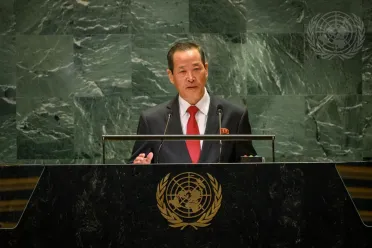Statement
Statement summary
The representative of the Democratic People’s Republic of Korea said the world is faced with challenges with no exception to his country which, however, recorded valuable successes. “First, the DPRK [Democratic People’s Republic of Korea] Government puts it as the primary State policy to keep supplying the children under school age with dairy products and provide school children with essential stationary at the State’s expense,” he said, pledging that “in 10 years’ time, the world will witness a completely changed development of the DPRK”. Noting that the security landscape of the Korean Peninsula is becoming much more acute, as the United States and its allies have staged joint military exercises one after another, he stated: “Our nuclear weapons were just made and exist to defend ourselves.” Spotlighting that since last October, the indiscriminate massacre by Israeli authorities has claimed over 40,000 Palestinian civilian lives in Gaza, he said it is really shameful that such an act against humanity has persisted for one year. “This is entirely due to the patronage of the United States,” he emphasized. Turning to the Ukrainian situation, he said that Western countries are shifting the responsibility though it was the result of the eastward expansion of the North Atlantic Treaty Organization (NATO) and provision of lethal equipment to their ally.
The representative of Kiribati, urging reinvigorated multilateralism, said that the United Nations must remain the central platform for collective global action. And, to ensure that the Organization deals effectively with the new, complex challenges confronting humanity, the Security Council must be reformed. Turning to climate change, he underscored the need to “move beyond words to concrete actions”. Kiribati continues to grapple with the challenges posed by sea-level rise, which endanger its land and agriculture. Noting that adaptation and resilience-building are critical for low-lying atoll nations like Kiribati, he stressed that coastal protection remains a priority. And, while adaptative measures such as planting mangroves and demarcating seagrass continue, there must also be interventions in hard infrastructure such as resilient seawalls. On the profound significance of the ocean to his country’s culture and environment, he said that “the health of our marine ecosystem is intrinsically linked to our nation’s well-being and the well-being of future generations”.
The representative of Djibouti said that financial institutions must provide developing countries with greater subsidies and access to financing under favourable conditions. For its part, the UN must play a major role in global economic coordination, and its Economic and Social Council should continue to lead in identifying emerging challenges, promoting innovation and achieving economic, social and environmental integration in sustainable development. Djibouti has enacted several ambitious, multidimensional measures to mitigate the effects of climate change and to strengthen national resilience; however, climate and development financing continues to fall short. “The promise of paying out $100 billion per year has not been kept,” he said, adding: “It is urgent to re-establish trust by moving toward the swift disbursement of the billions of dollars that are needed.” He also expressed profound sadness over the suffering of the Palestinian people and called for an immediate ceasefire in Gaza. On Sudan, he underscored the need to protect that State’s sovereignty.
Full statement
Read the full statement, in PDF format.
Photo

Previous sessions
Access the statements from previous sessions.
